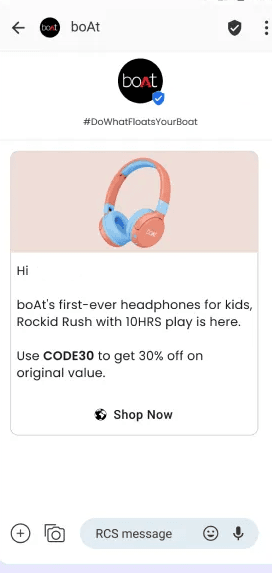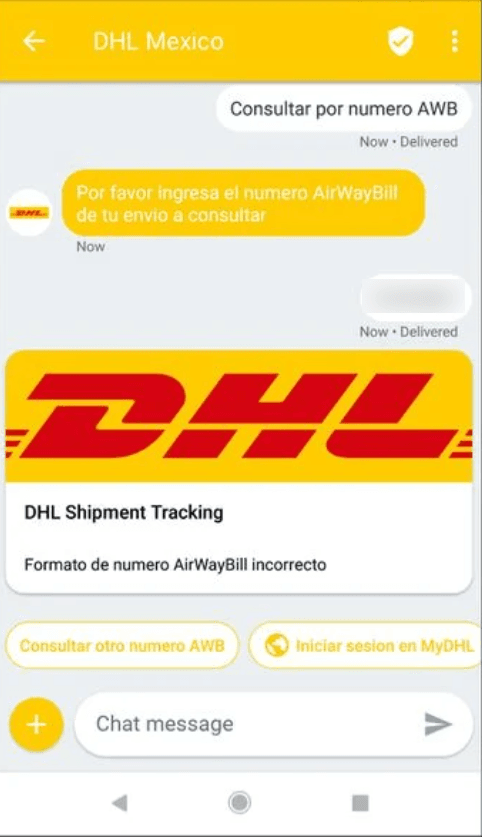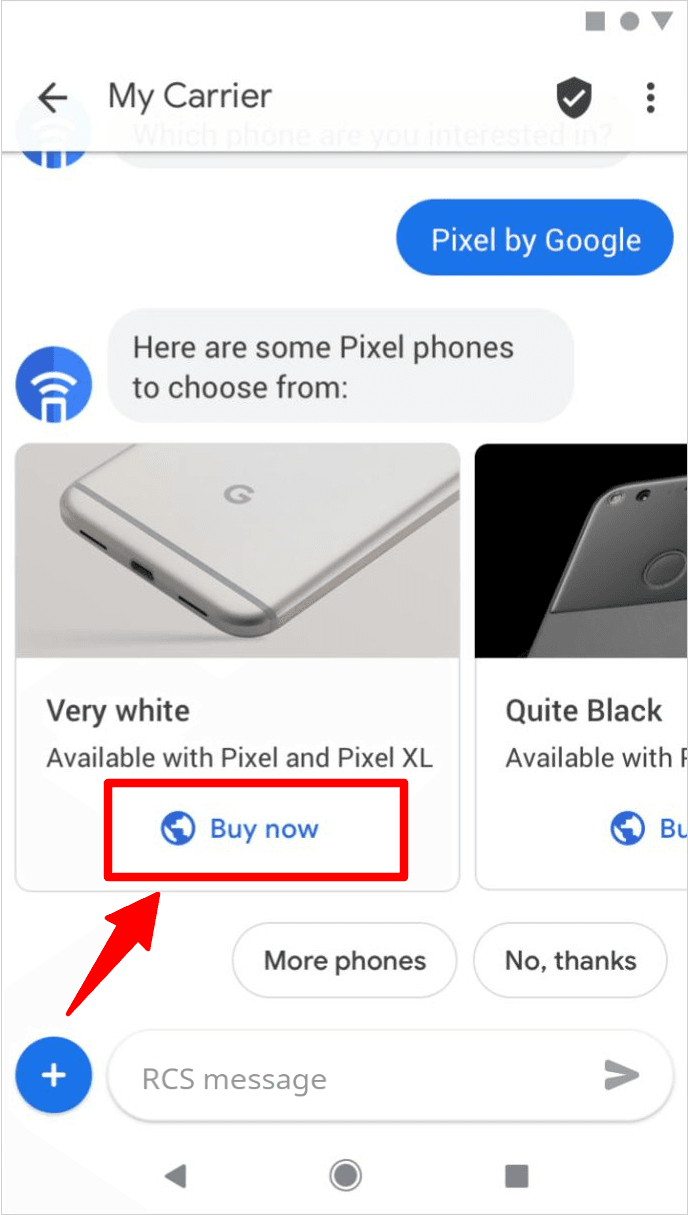How RCS Messaging is Transforming Conversational Commerce

In the e-commerce world, the more connected you are with your customers the more your chances of getting more sales. And nowadays 60% of customers want personalized interactions from businesses, as they don’t want to spend too much time browsing your catalog.
So, it makes sense to implement a robust customer-centric selling strategy that includes the dynamic nature of conversational commerce to engage your customers and compel them to make a buying decision.
This is where RCS comes in. With its advanced messaging features, you can reach out to your contacts in an effective manner, leading to enhanced engagement and improving the bottom line.
With that said, in this blog post, I’ll go over how you use RCS to implement a conversational commerce strategy into your outreach framework to provide around-the-clock customer engagement. Let’s get into it!
What is conversational commerce?
Conversational commerce refers to the integration of messaging platforms with shopping experiences. It allows your customers to interact with you directly through chat-based interfaces, receiving personalized recommendations, support, and even completing purchases—all without leaving the messaging app.
The core appeal of this approach, whether you are using it for RCS or WhatsApp conversational commerce, lies in its simplicity and the enhanced experience it provides for customers. It eliminates the need for users to switch between multiple platforms to engage with your business, making it easier to resolve queries and close deals.
Now, imagine being able to do all this with the richer capabilities of RCS Business Messaging. It makes the entire process more engaging and seamless.
For example, using RCS, you can engage customers with visually appealing messages that are both interactive and objective-driven. With the help of dynamic elements of RCS such as CTA buttons and suggestive replies, you can encourage customers to react to your messages, resulting in higher engagement and conversion rates.
Benefits of RCS in conversational commerce
RCS offers a wide variety of features, allowing you to leverage modern chatting functionalities to better engage your customers. Having said that, here are some of the key benefits of using RCS for conversational commerce:
Visually appealing messaging
As RCS is an advanced messaging protocol, it comes with media-rich messages, including high-def visuals, guides, GIFs, and audio files, providing a complete sales engagement. This is something traditional SMS is not able to achieve.
Additionally, using these capabilities, you can send marketing messages that showcase your products and convince customers to check them out. Plus, the carousel feature in RCS allows you to send multiple products at the same time, enabling your customers to choose the one that fits their needs the most.

A great example of this is, suppose you are running an online store and a customer is interested in buying a pair of sneakers, you can send high-resolution images, a 360-degree video of the product, and even interactive options to select different colors or sizes—all within a single message thread.
This significantly enhances the shopping experience, as users can view products in detail before making a purchase.
Elevate your marketing to the next level with visually-appealing RCS messages.
Use Zixflow to add images, videos, and carousels to your RCS campaigns, resulting in higher interaction and conversion rates.
RCS campaignsOptimized chatting
RCS was developed so that Android users can enjoy similar communication functionality as iPhone users. Also, the SMS messaging was long due an upgrade. That’s why, RCS comes with robust communication options to not only let you share information but take action.
For instance, you can access live chatting features like typing indicators and read receipts to streamline your conversations, ensuring your messages are being seen by your audience.
Seamless checkouts
Another excellent aspect of using RCS is its ability to integrate with other apps present on your mobile device like Maps, Browser, or third-party applications.
You can connect RCS with payment gateways so your customers can use them to complete their purchases straight from the Messaging app. Plus, RCS messages are secured with end-to-end encryption, safeguarding customers’ data and preventing data leads during transmission.
Whether it is through a mobile wallet or credit card processing, the ease of making payments directly within the chat can significantly reduce cart abandonment rates and drive more sales.
Put yourself in your customers’ shows, and imagine receiving a product recommendation via RCS. You can easily select your favorite product and complete the payment in just a few taps, without leaving the comfort of one single app. This fluid experience is a game-changer for conversational commerce.
Enhanced customer support
In addition to facilitating purchases, RCS messaging can be used for proactive customer support. You can send order confirmations, delivery updates, and reminders directly to your customers in a rich format.
These notifications can even include suggested actions, such as tracking a delivery or reordering a product. This real-time engagement not only enhances the customer experience but also builds loyalty by keeping customers informed and engaged at every step of their buying journey.

How to adopt RCS into your conversational commerce strategy?
By now, you have gotten a good idea of why RCS can be an amazing channel to think about when implementing a conversational commerce selling methodology. Now, it’s time to see how you can go about achieving.
Below are the ways you can follow to leverage RCS to offer a tailored shopping experience to your customers and boost revenue for your business.
Select the right RCS service provider
The first step to using RCS is to decide on a suitable RCS service provider to gain access to the required framework and integrate it with your existing systems.
A provider can guide you through the registration process and get you started with RCS Business Messaging. On top of that, a provider offers you the software to run outreach campaigns to craft and send messages to your contacts.
Not just that. Using an RCS provider can ensure that your communications comply with data privacy laws, helping you avoid common mistakes and enabling you to maximize your ROI. How can you select a service provider for your RCS initiatives?
Well, Zixflow is one of the leading providers that is partnered with Google along with network operators like Airtel, Vodafone, and Jio to ensure maximum deliverability.
Integrating RCS with your platform
Before you can start implementing RCS, you have to make sure that it is connected with your e-commerce platform (website or online store.) By integrating RCS with your current infrastructure, you can streamline your business communication by easily accessing customer data and sending personalized messages.
Another platform that you would want to integrate with RCS is your CRM or customer database. This way, you and your team can quickly find the relevant information about a particular customer.
Linking RCS with your specific CRM varies based on the integration capabilities provided by your system. For example, Zixflow includes a native CRM where you can manage customer data and opt-ins effectively. This way, the system can automatically skip the contacts that have decided to opt out.
Set up RCS chatbots
A big part of conversational commerce is using chatbots or NLP (Natural Language Processing) agents to engage your customers 24/7 and address their issues by utilizing your help center articles.
These chatbots can be trained to provide tailored responses to customers by analyzing their purchase history, past conversations, and browsing behaviors.
In case an issue is too complicated for a chatbot to handle, the ticket can be escalated to the next level where a human agent can take over the conversations and guide the customer accordingly. Furthermore, platforms like Zixflow come with automation functionality to set up a chatbot for both RCS and WhatsApp engagement.
Run highly-engaging initiatives
Another way to leverage the outstanding capabilities of RCS is to execute interactive and engaging outreach with the help of RCS messaging templates.
Using these templates, you can engage customers in a wide variety of scenarios, whether it be marketing, transactional, customer support, or authentication. On top of that, you can further optimize your campaigns to make your customers take action after receiving your messages.
For example, if you are sending promotional messages to market your offerings, adding a “Buy Now” button to the cards can significantly increase your chances of getting a purchase as customers can take immediate action.

How can you also design similar RCS messages to boost interactivity? By leveraging the RCS template editor of Zixflow, you can craft tailored messaging templates based on your marketing needs. The templates are divided into three categories, plain text, rich card, and carousel. You can pick a category at the time of creation and enter the necessary information to get your templates ready to be sent.
Is RCS the future of conversational commerce?
No doubt, RCS will greatly impact how businesses reach out to their customers. It is a solid communication channel that will affect the overall mobile marketing as a whole.
Due to its ease of use and powerful features, you can effectively connect with customers, deliver meaningful content, and drive engagement for your e-commerce store.
Plus, as RCS becomes more accessible due to increased adoption, brands will start using it over traditional SMS marketing. It has reached a point where Apple had to support RCS functionality with its recently launched iOS 18 after prolonged requests from its customers.
This addition can optimize cross-platform communications, allowing both Android and iPhone users to share information efficiently.
This fact enables you to connect with your customers via RCS regardless of their device types, letting you streamline outreach and boost your revenue.
Get started with RCS and skyrocket customer engagement
RCS Business Messaging depicts the advancement in mobile communication that offers a rich and interactive alternative to traditional SMS.
By incorporating multimedia messaging, advanced chat features, and integrated payment options, RCS can transform conversational commerce for e-commerce, driving sales with its ability to combine the best of messaging with app-like functionality,
RCS has the potential to transform how you and customers interact, making commerce as easy as having a conversation. This way, you can leverage this technology and position yourself to thrive in the next era of digital commerce.
The first step to do that is to get yourself an RCS service provider, allowing you to get started with this amazing channel, and what better choice for a provider than Zixflow. With us, you not only get RCS but also numerous other complementary features to make the most of your marketing outreach.
Packed with CRM, automation, lead generation, and an AI-powered engine, you can take your business communication to the next level with Zixflow. So create an account to access a 7-day free trial to see the platform in action.
